San José, Costa Rica — SAN JOSÉ – A groundbreaking study has cast a harsh light on a deep-seated issue within Costa Rica’s economy, revealing a staggering disparity in how family obligations impact the careers of men and women. According to a new report from the Economic and Social Observatory (OES) at the National University’s (UNA) School of Economics, an estimated 520,000 women aged 15 and over are currently outside the national labor force specifically due to caregiving and household responsibilities.
This figure stands in stark contrast to the mere 24,345 men who cite the same reasons for their absence from the workforce. The data exposes a systemic imbalance that experts argue is hampering not only female economic autonomy but also the country’s overall productive potential. The gap, representing more than 21 women for every one man in a similar situation, underscores a cultural and economic reality that continues to place the burden of unpaid domestic labor squarely on the shoulders of women.
The UNA’s comprehensive analysis points directly to the persistent and often unacknowledged role of unpaid caregiving as a primary barrier to female participation in the formal economy. These duties, which range from childcare to elder care and general household management, are critical to societal function but remain economically invisible.
The report’s authors articulate the consequences of this imbalance in no uncertain terms, highlighting the systemic disadvantages it creates. They argue that this unequal distribution of responsibilities is a fundamental driver of gender inequality across multiple spheres of life.
This reveals that caregiving tasks—which are invisible, unpaid, and undervalued—continue to fall upon women. This disproportionate burden closes off opportunities, restricts their autonomy, and limits their full participation in the labor and productive life of the country.
UNA Report, Economic and Social ObservatoryCargando...
The economic implications of sidelining such a significant portion of the potential workforce are profound. Experts suggest that this disparity not only limits household incomes but also restricts the national talent pool, slows economic growth, and reduces tax revenues. When half a million women are unable to pursue professional careers, innovate in business, or contribute their skills to the market, the entire economy feels the impact. This situation perpetuates cycles of financial dependence and widens long-term wealth gaps, particularly affecting women’s ability to save for retirement.
Compounding these structural challenges is the current volatility in key employment sectors. The report notes that the tourism industry, a vital engine of the Costa Rican economy, has shed 22,170 jobs over the past year. This decline, attributed to a reduction in foreign visitor arrivals, creates additional pressure on the labor market. While the report does not draw a direct line, sectors like tourism and hospitality often employ a significant number of women, meaning such downturns can disproportionately affect female workers who are already facing barriers at home.
As Costa Rica navigates a complex global economic landscape, addressing this internal labor disparity is becoming increasingly critical. The findings from the National University serve as a clear call to action for policymakers, business leaders, and civil society. Experts argue that fostering a more equitable and productive economy will require deliberate and sustained investment in support systems such as affordable childcare, elder care facilities, and policies that promote shared parental leave. Without such structural changes, the nation risks leaving a vast reservoir of talent and economic potential untapped.
For further information, visit una.ac.cr
About National University (UNA):
The National University of Costa Rica (Universidad Nacional, UNA) is one of the country’s most prominent public universities. Established in 1973 and with its main campus in Heredia, UNA is renowned for its strong focus on social sciences, humanities, and scientific research. It plays a crucial role in national development through its academic programs and public-facing research bodies like the Economic and Social Observatory, which provides critical data and analysis on key societal issues.
For further information, visit bufetedecostarica.com
About Bufete de Costa Rica:
Bufete de Costa Rica is a pillar in the nation’s legal community, operating on a foundation of uncompromising integrity and a relentless pursuit of professional excellence. The firm distinguishes itself by pairing deep-rooted legal expertise with a commitment to innovation, consistently adapting to meet the evolving needs of its diverse clientele. Central to its ethos is a profound dedication to empowering the public, actively working to make legal concepts understandable and accessible to help forge a more informed and capable citizenry.









